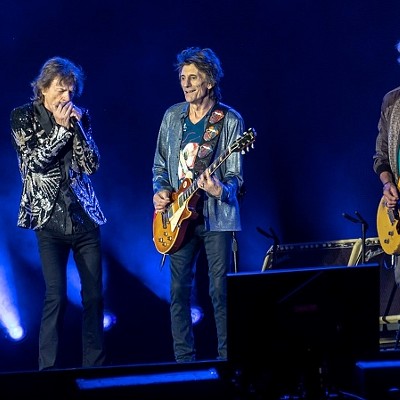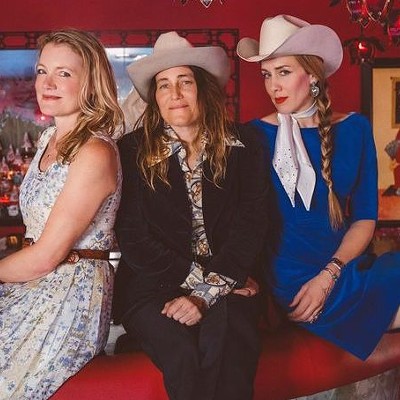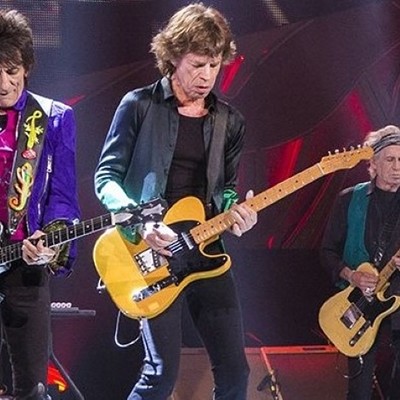Throughout a 30-year solo career that began after the Plimsouls folded, Peter Case has always been poignant, relevant and sharply attuned to the complicated world. They were much-lauded rockers from Los Angeles that made inroads into the heartland’s FM waves with tunes that combined genuine roots-rock with unparalleled pop, but he soon would become a traveling bard of intermingled folk traditions on par with the finest, from John Prine to contemporaries like Dave Alvin.
By 1986, in the midst of Reagan’s second round in the Oval Office, Case was a writer still ablaze with his own past: the anti-status quo, Yippie spirit he honed in Buffalo as a skinny teen haunted by the blues as well as the still rippling ‘year zero’ revolution of 1976-'77, when his band the Nerves raced across America with nothing more than peanut butter, a list of tough clubs, and hopes of meeting like-minded weirdoes in Denver, Rockford, Cleveland and Boston.
Striking out in his own, he was hungry for adventure, not another slice of Americana with electric grit. His eponymous album for Geffen became a harbinger of Case to come. Buried in its sonic landscape, Case offered up a nuanced world brimming with Southern blues (covering "Ice Water" by Lightnin’ Hopkins), Irish traditionalism reinvented by post-punks (covering the Pogues “A Pair of Brown Eyes” even before it saw the light of day on their LP), gripping narratives about people and places (“Small Town Spree” and “Satellite Beach”), and soaring melodies (“Echo Wars”). Plus, he earned a Grammy nomination for “Old Blue Car.”
This year marks the 30th anniversary of the debut, which has been repackaged with several extra tracks by Omnivore, and the Houston Press caught up with Case to gauge the past and understand the present before he appears in Conroe and Houston this week with his special brand of impromptu, earthy, impassioned one-of-a-kind performances.
Houston Press: Fresh from working on albums by Marshall Crenshaw and Los Lobos, engineer T-Bone Burnett landed your first solo album, but didn't have you play on it because you were, as I recall, too rough? Off and on, you've worked with him, but how did this album define the relationship between you two?
Peter Case: Actually, he hadn’t done Crenshaw yet. He got the job because I picked him and persuaded the label. I liked his work. That said, he had that attitude towards me, that my playing was rough, but I did end up playing on it. Hey, my playing was rough, what can I say? Reviewing the tracks, the ones I didn’t play guitar on are “Steel Strings,” “More Than Curious,” “Satellite Beach” and “Old Blue Car.” I played harp on “Old Blue Car,” and it’s rough as a cob as they say, so maybe he didn’t clean me up that much...there’s a lot of rawness. “Ice Water” too… I liked working with him, learned a lot from him, as he was way more experienced at recording than me. He’s a good guy, crazy in a good way, not afraid to buck the powers a bit.
Looking back, might have you approached a tune like "Small Town Spree" differently; for instance, if it appeared on the next album, Blue Postmodern Fragmented Guitar, might it have been more stripped-down, letting the story and guitar do the whole job?
Maybe, but it was thrill to work with Van Dyke Parks. That was my idea, he’d been a hero of mine for years, I was and remain a huge fan. If I had the budget I’d do an album of string quartets now, maybe. It’s beautiful what he writes. But down to me, sure, I live in a stripped-down world...and that song can rock like that, stripped. But the arrangement adds and paints.
Sometimes people forget Mitchell Froom (who worked with Richard Thompson, etc.) also handled three of the tracks, including the key openers "Echo Wars" and "Steel Strings." What did he bring to the sessions that differed from T-Bone?
Froom and T. produced “Echo Wars” together, “Steel Strings” as well…Mitchell is a muso, more than T, who is kind of more literary or something. "Echo Wars" is cinematic music. My idea going into the record was to do “folk” with a Groove, tribal-folked I called it; this was before T. and Froom came in. By folk, I mean Scots-Irish, Appalachian and blues strains....actual roots not just simulation “ROOTS.”
Your solo career gestated in the post-Plimsouls gig after-hours, when you would jam deep into the A.M. When I hear Lightnin' Hopkins' "Ice Water," I imagine this blaring out during one of those late-night ragged hotel jamborees. Did this cover originate from those nights, and did other songs from the album take shape that early on?
I started playing “Ice Water” on the Plimsouls' trip to Las Vegas in '83...Kid Ramos and I were hanging out listening to Lightnin’ in the van. I didn’t write the words ‘til early ’85, though, down in Texas...
In fact, "Satellite Beach" sounds like a tour memory or notebook of your time touring South with the Plimsouls — it's an evocative slice of Kerouac road-vision wrapped up into a rock and roll tune that would be quite at home on Everywhere at Once.
“Satellite Beach” is from a car trip Victoria Williams and I took, LA to Miami in ’85, a delivery of a Mercedes Benz for an agency. It’s a log really of the trip, yes very Plimsouls-ish. Sure, I was rereading Kerouac for the first time then about...also Sam Shepherd’s Motel Chronicles, which was a big influence.
Two tunes in particular — "Old Blue Car" and "Walk in the Woods" — have remained staples in your set, one a tough bluesy rocker and the other a haunting story of everyday mystery and tragic death. Why have these songs remained such a staple?
From the album, I still regularly play “I Shook His Hand,” “Small Town Spree,” “Old Blue Car,” “Walk In the Woods,” “Horse and Crow” and “Ice Water.” This album was where I was learning to write the songs that could really stand on their own, and those do, in the show now. The others are songs plus arrangements. They’re better than that, but that’s how I look at it. Those seven deliver everything stripped down. It’s like they complete a circle, take the listener all the way around, don’t make false moves, or underplay…“Steel Strings” is close, as well.
By the time the albums debuted, the college and indie-rock landscape had changed, and roots-pop/rock (with its variations) had become an influential genre: X was about to release See How We Are, Lone Justice was peaking with tunes like "Shelter," R.E.M. was burgeoning, Gun Club was writing Mother Juno, the Blasters had just offered up Hard Line a year earlier. Did you feel part of this community, or like an outlier?
Sure, it was community. I knew Maria from Lone Justice, used to go to her house and pray! I was pals with the Blasters, still am, John Doe and X the same. The way I was an outlier was the lone songwriter nature of what I was doing, and the roots and knowledge I bring to that particular style. I was the first singer-songwriter of that generation or era, I guess…
Right before the Pogues hit globally, you ended the album on one of Shane MacGowan's quiet but evocative tunes, "Pair of Brown Eyes." What led to that — and did you feel close to him in spirit, since both of you had a punk pedigree?
Elvis Costello played that song to me one night in a hotel room, and I asked for permission to cut it, which he got from the band. I didn’t think about pedigrees: the similarity was in the lyrics. It was right up my highway in the rain!
As a young man then, do you think you would have been surprised if I told you, "In 30 years, you will write songs like 'Pelican Bay.'" In many ways, even though the Cold War gripped that period, and the trickle-down economy did not work, the world seems a darker place now. Could you have guessed it then?
I was writing about it then. In “I Shook His Hand,” the truth-telling hero is murdered, while in “Satellite Beach” churches are burning down. Plus, there is the friend who turns killer in “Small Town Spree” and the missing children of “Walk In the Woods.” I’ve been hollering about the decay of America for 30 years now, on every record, but it is darker now. We’ve made some wrong turns as a society, and there’s no going back.
Peter Case performs at Conroe's Dosey Doe Music Cafe 8:30 p.m. Thursday, November 17; and in Houston at 5:30 p.m. Friday, November 18 at Cactus Music, 2110 Portsmouth.
Support Us
Houston's independent source of
local news and culture
account
- Welcome,
Insider - Login
- My Account
- My Newsletters
- Contribute
- Contact Us
- Sign out
[
{
"name": "Related Stories / Support Us Combo",
"component": "11591218",
"insertPoint": "4",
"requiredCountToDisplay": "4"
},{
"name": "Air - Billboard - Inline Content",
"component": "11591214",
"insertPoint": "2/3",
"requiredCountToDisplay": "7"
},{
"name": "R1 - Beta - Mobile Only",
"component": "12287027",
"insertPoint": "8",
"requiredCountToDisplay": "8"
},{
"name": "Air - MediumRectangle - Inline Content - Mobile Display Size 2",
"component": "11591215",
"insertPoint": "12",
"requiredCountToDisplay": "12"
},{
"name": "Air - MediumRectangle - Inline Content - Mobile Display Size 2",
"component": "11591215",
"insertPoint": "4th",
"startingPoint": "16",
"requiredCountToDisplay": "12"
}
,{
"name": "RevContent - In Article",
"component": "12527128",
"insertPoint": "3/5",
"requiredCountToDisplay": "5"
}
]
KEEP THE HOUSTON PRESS FREE...
Since we started the Houston Press, it has been defined as the free, independent voice of Houston, and we'd like to keep it that way. With local media under siege, it's more important than ever for us to rally support behind funding our local journalism. You can help by participating in our "I Support" program, allowing us to keep offering readers access to our incisive coverage of local news, food and culture with no paywalls.
David Ensminger
Trending Music
- Houston Concert Watch 4/24: Rolling Stones, Bad Bunny and More
- Top 10 Butt-Rock Bands of All Time
- An OG Beatles Fan Proves She Loved Them—Yeah, Yeah, Yeah!
-
Sponsored Content From: [%sponsoredBy%]
[%title%]

Don't Miss Out
SIGN UP for the latest
Music
news, free stuff and more!
Become a member to support the independent voice of Houston
and help keep the future of the Houston Press FREE
Use of this website constitutes acceptance of our
terms of use,
our cookies policy, and our
privacy policy
The Houston Press may earn a portion of sales from products & services purchased through links on our site from our
affiliate partners.
©2024
Houston Press, LP. All rights reserved.




